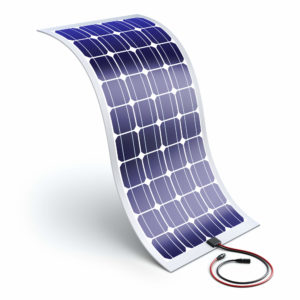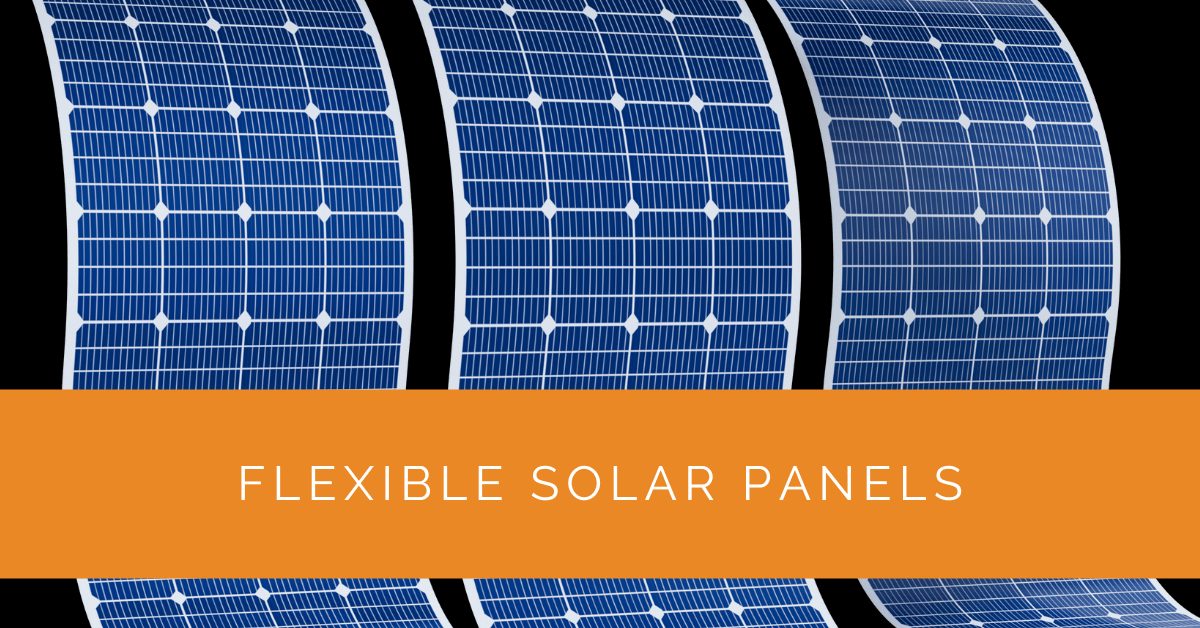Flexible solar panels have revolutionized the way we harness solar energy. They offer versatility, efficiency, and ease of installation, making them popular for various applications, from RVs to boats and off-grid systems. This guide will explore everything you need about flexible solar panels, including their advantages and installation tips.
Contents
- 1 Key Takeaways
- 2 What Are Flexible Solar Panels?
- 3 Implementing Flexible Solar Panels for a Mobile Power Solution
- 4 Expert Insights From Our Solar Panel Installers About Flexible Solar Panels
- 5 Experience Solar Excellence with Us!
- 6 Conclusion
Key Takeaways
- Flexible solar panels offer adaptability to almost any surface, making them versatile for various applications, including RVs and boats.
- When choosing flexible panels, consider wattage, efficiency, and durability to ensure they meet your specific energy needs.
- Incorporating flexible solar panels into your renewable energy strategy can lead to long-term cost savings and a more sustainable future.
What Are Flexible Solar Panels?
Flexible solar panels, often called flexible panels, are a remarkable alternative to traditional rigid solar panels. They are constructed using lightweight and bendable materials, such as thin-film solar cells or CIGS (copper indium gallium selenide), different from the crystalline silicon solar cells used in rigid panels. This fundamental difference allows flexible panels to, as the name suggests, flex and conform to almost any surface.
Advantages of Flexible Solar Panels
Versatility in Surface Compatibility
One of the standout advantages of flexible solar panels is their adaptability to various surfaces. Unlike rigid solar panels that require a flat surface for installation, flexible panels can be mounted on curved surfaces, uneven terrain, and even on vehicles like RVs and boats. This flexibility opens up a world of possibilities for solar power generation in previously unsuitable locations for traditional panels.
Lightweight and Durable
Flexible solar panels are incredibly lightweight, making them an excellent choice for portable power stations and applications where weight is a concern. Additionally, their construction using durable materials ensures longevity and resistance to wear and tear, making them ideal for outdoor and off-grid use.
Easy Installation
Installing flexible solar panels is a straightforward process. Depending on your preference and the surface type, they can be affixed to surfaces using adhesive or secured with mounting brackets. The ease of installation makes them a practical choice for DIY enthusiasts looking to set up their solar systems without needing professional assistance.
Efficient Power Generation
Despite their flexibility, modern solar panels are highly efficient at converting sunlight into electricity. Some options are equipped with monocrystalline cells, known for their high energy conversion efficiency. This ensures that you can generate a significant amount of solar power, even with limited space.

Choosing the Best Flexible Solar Panels
Selecting the right flexible solar panels for your specific needs requires careful consideration. Here are some factors to keep in mind:
Wattage and Efficiency Ratings
When choosing flexible panels, pay attention to their wattage and efficiency ratings. Due to lower efficiency, a 100-watt flexible solar module may not generate the same power as a 100-watt traditional rigid panel. Consider your energy requirements and available space to make an informed decision.
Material Used
The materials used in the construction of flexible solar panels can vary. Some panels feature monocrystalline cells, while others use thin-film technology or CIGS. Monocrystalline cells offer higher efficiency, but thin-film panels may be more flexible. Assess your priorities regarding efficiency and flexibility to make the right choice.
Warranty and Durability
Check the warranty and durability of the panels you’re considering. A longer warranty period generally indicates the manufacturer’s confidence in their product’s lifespan. Additionally, consider the environmental conditions your panels will be exposed to, which can impact their longevity.
Pros and Cons of Flexible Solar Panels
To provide a balanced perspective, let’s explore the pros and cons of flexible solar panels:
Pros
- Flexibility: They can be installed on curved surfaces and uneven terrain.
- Lightweight: Ideal for portable power stations and applications with weight restrictions.
- Easy to Install: DIY-friendly installation options.
- Efficient Power Generation: Some models feature high-efficiency monocrystalline cells.
- Durable: Designed to withstand outdoor conditions.
- Off-Grid Capabilities: Suitable for off-grid power generation.
Cons
- Lower Efficiency: Compared to some traditional rigid panels.
- Portable vs. Fixed: May not be as efficient as fixed, traditional panels.
- Surface Sensitivity: Efficiency may vary depending on the surface.
fpto
Installation Tips for Flexible Solar Panels
Installing flexible solar panels can be a rewarding DIY project. Here are some tips to ensure a successful installation:
Surface Preparation
Before installation, ensure the surface is clean, dry, and debris-free. This will promote better adhesion and prevent damage to the panels over time.
Adhesive or Mounting Brackets
Choose between adhesive and mounting brackets based on your surface type and personal preference. The adhesive suits smooth surfaces while mounting brackets provide flexibility on uneven terrain.
Wiring and Inverter
Properly wire your flexible panels to your solar power system and connect them to an inverter to convert DC electricity into AC power for use in your home or RV.
Consider Solar Power System Size
Factor in the size of your solar power system to determine how many flexible panels you need. Consider your energy consumption and location to optimize your system’s output.
Implementing Flexible Solar Panels for a Mobile Power Solution
Background
At Solar Panels Network USA, we often encounter clients seeking versatile and efficient solar solutions for mobile applications. One such project involved a client who wanted to power their RV using flexible solar panels. The client’s primary goal was to achieve a reliable off-grid power source without compromising on space or vehicle performance.
Project Overview
The project aimed to equip the client’s RV with a robust solar power system using flexible solar panels. The RV required a solution that would provide sufficient energy for appliances and electronics while being lightweight and easy to install. Given the curved and limited surface area of the RV roof, flexible solar panels were the optimal choice.
Implementation
Designing the System
We began by assessing the client’s energy needs, analyzing their daily power consumption to determine the required solar capacity. This involved calculating the wattage necessary to run the RV’s appliances, lighting, and other electronics.
Selecting the Panels
Based on the energy assessment, we selected high-efficiency monocrystalline flexible solar panels. These panels were chosen for their superior energy conversion rates and durability. We also considered the panels’ ability to withstand environmental conditions and their weight, which was critical for maintaining the RV’s performance.
Installation Process
Surface Preparation
We started by preparing the RV roof, ensuring it was clean and free of debris. This step was crucial for the adhesive to bond effectively, creating a stable and secure installation.
Panel Installation
The panels were installed using a high-strength adhesive designed for solar panel mounting. This method allowed the panels to conform to the curved surface of the RV roof, optimizing the available space. We ensured there were no gaps or overlaps that could affect performance.
Wiring and Connection
The panels were connected in series to maximize voltage output, and the wiring was carefully routed to minimize exposure to environmental elements. We used a charge controller to regulate the power flow from the panels to the battery bank, ensuring efficient and safe energy storage.
Testing and Validation
After installation, we conducted thorough testing to verify the system’s performance. We measured the electrical output under various conditions to ensure the panels were generating the expected power. Any necessary adjustments were made to optimize efficiency.
Results
The flexible solar panel system provided a reliable and sustainable power source for the client’s RV. The panels performed well in various weather conditions, demonstrating their durability and efficiency. The client reported a significant reduction in reliance on external power sources, enjoying the benefits of off-grid living.
Summary
This case study highlights the advantages of using flexible solar panels for mobile applications. By leveraging the unique properties of these panels, we successfully provided a tailored solution that met the client’s energy needs while maintaining the RV’s performance and aesthetics. Flexible solar panels offer a versatile and efficient way to harness solar energy, especially in scenarios where traditional panels are impractical.
Expert Insights From Our Solar Panel Installers About Flexible Solar Panels
Flexible solar panels are incredibly versatile, allowing for installation on surfaces where traditional panels can’t be mounted. This adaptability opens up new possibilities for solar energy usage, especially in mobile applications like RVs and boats.
Senior Solar Installer
Despite their lightweight design, flexible solar panels are durable and efficient. They are ideal for off-grid systems where portability and ease of installation are paramount.
Lead Solar Technician
When choosing flexible solar panels, it’s essential to consider the materials and efficiency ratings. High-efficiency monocrystalline cells offer better performance, while thin-film panels provide greater flexibility. Understanding these differences helps in selecting the best panels for your needs.
Solar Installation Expert
Experience Solar Excellence with Us!
Trust in Solar Panels Network USA, where our seasoned experts deliver top-quality solar solutions for homes and businesses nationwide. With a legacy of countless successful installations and a commitment to sustainable energy, we’re your reliable partner in the solar journey. Ready for a brighter, eco-friendly future? Call us now at (855) 427-0058 and harness the power of the sun!
Conclusion
Flexible solar panels have revolutionized how we harness solar energy, offering adaptability, efficiency, and ease of installation. In our experience as experts in the field of solar energy, we’ve witnessed the transformative power of these panels firsthand.
Whether you’re looking to power your RV, boat, or off-grid cabin, these panels provide a flexible solution for generating clean, sustainable energy. By understanding their advantages, choosing the right panels, and following proper installation techniques, you can harness the sun’s power in almost any location and surface.
Incorporating flexible solar panels into your renewable energy strategy can provide long-term benefits. With advancements in technology and the wide range of options available, it’s easier than ever to switch to solar power, even in unconventional settings.
As we’ve seen with our clients, these panels offer environmental benefits and significant cost savings over time. Their lightweight and durable design makes them ideal for those seeking portable power solutions.
So, whether you’re exploring the open road in your RV or enjoying the serenity of life on the water, flexible solar panels can provide the energy you need to power your adventures. With their flexibility, efficiency, and ease of use, the future of solar power is looking brighter than ever. Make the smart choice and embrace the possibilities of flexible solar panels for a greener, more sustainable future.
About the Author
Solar Panels Network USA stands at the forefront of solar energy solutions, driven by a team of seasoned solar engineers and energy consultants. With over decades of experience in delivering high-quality solar installations and maintenance, we are committed to promoting sustainable energy through customer-centric, tailored solutions. Our articles reflect this commitment, crafted collaboratively by experts to provide accurate, up-to-date insights into solar technology, ensuring our readers are well-informed and empowered in their solar energy decisions.

